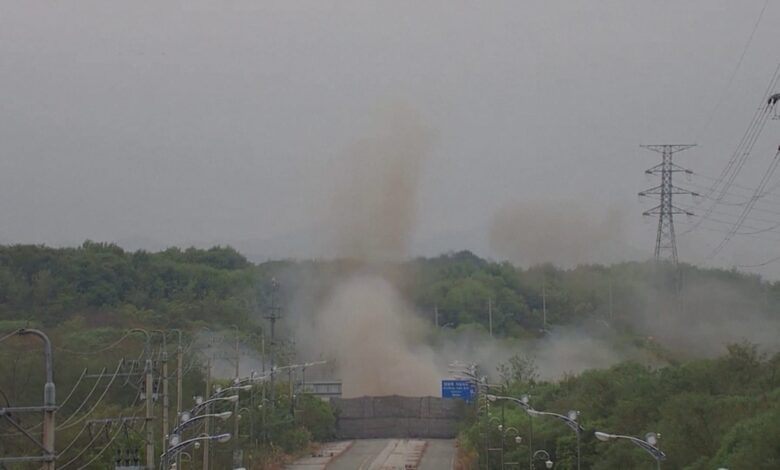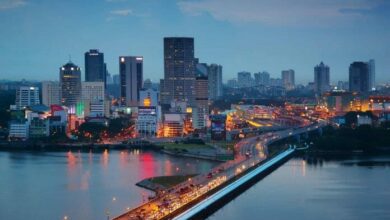Russia-Ukraine drawing South and North Korea troops unlikely to spike regional conflict

[ad_1]
Smoke rises after North Korea blows up sections of inter-Korean roads on its side of the border between the two Koreas, according to South Korea’s military, as seen from the South Korean side, October 15, 2024, in this screen grab from a handout video.
South Korean Defense Ministry
South and North Korea troops potentially entering the Russia-Ukraine war is unlikely to stoke a wider conflict between the two Korean countries, experts said.
South Korea is reportedly considering sending intelligence personnel to Ukraine, according to Yonhap News.
This comes after South Korea’s Defense Ministry told NBC News that North Korea had sent up to 12,000 troops to fight on Russia’s side.
Yonhap said South Korea could deploy military personnel from intelligence units, “who could analyze North Korean battlefield tactics or take part in interrogations of captured North Koreans.”
The U.S. on Wednesday confirmed that North Korean troops had been sent to Russia.
While South Korea has not publicly confirmed or denied plans to deploy personnel in Ukraine, the country has reportedly warned that it would send arms, depending on the level of cooperation between Moscow and Pyongyang.
This would also mark a departure from Seoul’s long-held policy of not supplying weapons to countries in conflicts, South Korea President Yoon Seok Yeol reportedly said.
Experts told CNBC that South Korea was unlikely to authorize the deployment of troops for combat in Ukraine.
“I do not foresee the Yoon administration approving the deployment of troops for actual combat operations on Ukrainian soil,” said Nah Liang Tuang, a research fellow at Singapore’s S. Rajaratnam School of International Studies.
Seoul deploying observers will not be a significant escalation, as Kyiv’s partners have noncombatant observers already in Ukraine, Nah said.
If Seoul deploys military personnel to help Ukraine with intelligence, technical training, or even to help interrogate North Korean prisoners of war, it would motivate Ukraine’s other allies to dispatch their own trainers or military support specialists to aid Ukraine.
“The messaging we are seeing is likely intended to deter the actual deployment of North Korean troops to Ukraine from Russia. We don’t know how that will play out, just yet,” said Naoko Aoki, a political scientist at American policy think tank Rand.
Aoki said that there was a possibility of personnel from the two Korean countries coming into contact should both sides deploy them, which could “complicate the situation significantly.” But that will depend on how the North Korean troops are deployed, she added.
Nah said that such an event could occur only if North Korean troops penetrate Ukrainian defensive lines and encounter South Korean personnel embedded with Ukrainian units. “In such a case, South Korean troops would be shooting in self defence, thus limiting the nature of such combat encounters.”
Such an encounter will have little effect politically, given that Moscow and Pyongyang have denied North Korean troops are being employed in the war.
Korea concerns
Tensions on the peninsula have been rising in recent weeks, with North Korea blowing up connecting railways and roads on its side, after sending trash balloons into South Korea earlier this year. It has also accused the South of sending drones carrying propaganda leaflets over Pyongyang.
While tensions have risen, experts suggest armed conflict is not on the horizon. “North Korea would not want to fight a war on the Korean peninsula when some of its troops are in Ukraine fighting someone else’s war,” Rand’s Aoki said.
Pyongyang’s goal in supporting Russia, she highlighted, is to try to deepen relations with Moscow so that it can gain what it needs from Russia, like information for advanced weapons technology, and combat experience.
“Pyongyang judges that blowback from it’s support of Moscow will not infect the Korean Peninsula,” RSIS’ Nah said. “I would argue that Kim Jong Un sees his relationship with Vladimir Putin in a very transactional light, while being located in a geostrategic silo unlinked with war prospects on the Korean Peninsula.”





